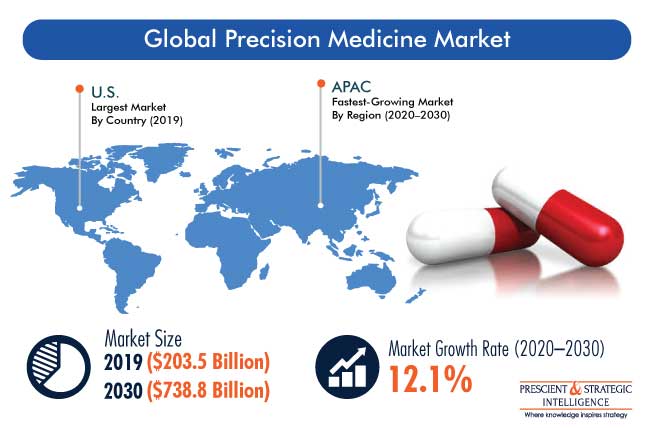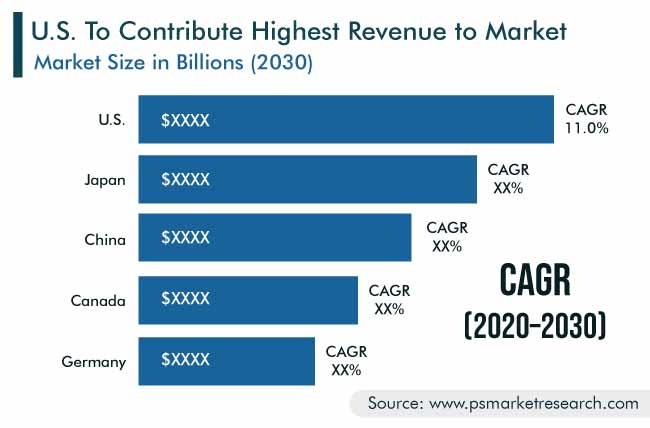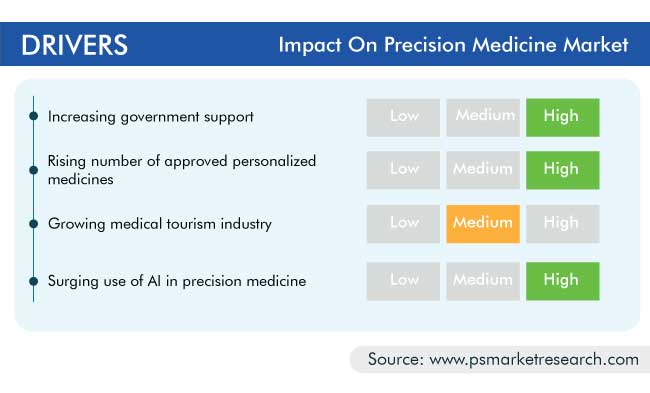Report Code: 12170 | Available Format: PDF | Pages: 280
Precision Medicine Market Research Report: By Type (Therapeutics, Diagnostics, Personalized Medical Care) - Global Industry Analysis and Growth Forecast to 2030
- Report Code: 12170
- Available Format: PDF
- Pages: 280
- Report Description
- Table of Contents
- Market Segmentation
- Request Free Sample
Market Overview
The global precision medicine market was valued at $203.5 billion in 2019, and it is projected to progress at a CAGR of 12.1% during the forecast period (2020–2030). The major factors responsible for the growth of the market are the rising government support for enhancing the awareness about personalized treatments, increasing number of approved personalized medications, growing medical tourism industry, and surging use of artificial intelligence (AI) in precision medicine.
Due to the COVID-19 pandemic, the market for precision medicine was positively impacted in the latter half of 2020. This was because the rising number of patients suffering from it and chronic diseases, such as cardiovascular diseases (CVDs) and cancer, resulted in a hike in the mortality rate all over the world. As a result, the focus of healthcare providers and patients shifted toward more-accurate and personalized treatments.

Due to Increasing Funding for Telemedicine, Personalized Medical Care Category To Witness Fastest Growth
Based on type, the personalized medical care category is expected to witness the fastest growth in the precision medicine market during the forecast period. This can be attributed to the growing funding and grants from the public and private sectors for telemedicine, increasing demand for remote patient monitoring services, and rising cases of genetically variable chronic diseases.
Owing to Increasing Prevalence of Chronic Diseases, North America To Lead Market
Geographically, the North American region accounted for the largest share in the market for precision medicine in 2019, and it is expected to maintain its position in the coming years. This is majorly ascribed to the increasing prevalence of chronic and lifestyle-associated diseases, such as diabetes and cardiovascular diseases (CVDs); rising number of government initiatives, such as funding and awareness programs, for precision medicine; growing disposable income, and surging healthcare expenditure.
However, the Asia-Pacific (APAC) region is expected to display the highest CAGR during the forecast period. This would majorly be due to the increasing healthcare expenditure, product launches, rising awareness related about precision medicine, presence of companies developing AI-driven precision medicine, development of the regulatory landscape, and availability of ample funding in the region.

Clinical Trials for Precision Medicine Are Key Market Trend
Several government organizations and pharmaceutical companies are currently involved in clinical trials for precision medicine. For instance, the National Cancer Institute (NCI) developed a project, named Molecular Analysis for Therapy Choice (MATCH), in June 2018 to conduct clinical trials regarding precision medicine and treat cancer tumors in about 6,000 individuals. Moreover, the decentralized method plays a vital role in precision medicine trials, as patients can be assessed remotely at their home, which reduces the travel cost and time, thereby leading to a higher patient participation rate.

Increasing Government Support Is Boosting Market Growth
The initiatives being taken by governments for developing personalized treatment are playing a pivotal role in the growth of the precision medicine market. According to the Personalized Medicine Coalition, a national health council located in Washington D.C., U.S., in July 2019, the Trump administration decided to bring the drug prices in the U.S. down, to make them comparable with international rates. The declaration was specifically taken to technologically advance personalized treatments and make them affordable for the masses. Moreover, according to the World Economic Forum, in 2017, Argentina launched a Precision Medicine Initiative Grant to begin the scientific procedures required to put the investigational precision medicine approaches to clinical practice.
Growing Medical Tourism Industry Is Driving Market
Precision medicine has been adopted by healthcare systems and patients for cancer, infectious diseases, and CVDs, globally. It helps prevent adverse drug reactions and increases the number of treatment options, which has already been driving the medical tourism industry in developing countries. For instance, the U.K. government is setting up three advanced therapy treatment centers to advance precision medicine and gene therapies. Furthermore, the U.K. is becoming a healthcare hub for international patients, with about $70 million already having been invested in the Industry Strategy Challenge Fund for the enhancement of its healthcare infrastructure.
Growing Use of AI in Healthcare Is Boosting Demand for Precision Medicine
Technological advancements through AI are revolutionizing the medical industry by helping healthcare professionals record clinical data and monitor it regularly, with greater ease and fewer errors. For instance, in 2018, researchers at the Seoul National University Hospital and College of Medicine developed an AI algorithm, called Deep Learning-Based Automatic Detection (DLAD), to examine chest radiographs and detect abnormal cell growth, such as potential cancers. Similarly, in August 2020, Renalytix AI plc and AstraZeneca plc came together to launch strategies for precision medicine for cardiovascular, renal, and metabolic diseases. Thus, the increasing usage of AI in precision medicine will boost the market growth.
| Report Attribute | Details |
Historical Years |
2014-2019 |
Forecast Years |
2020-2030 |
Base Year (2019) Market Size |
$203.5 Billion |
Forecast Period CAGR |
12.1% |
Report Coverage |
Market Trends; Revenue Estimation and Forecast; Segmentation Analysis; Regional Breakdown; Competitive Analysis; Companies’ Strategic Developments; Product Benchmarking; Company Profiling |
Market Size by Segments |
By Type; By Region |
Market Size of Geographies |
China; India; Japan; U.S.; Canada; Mexico; Brazil; Germany; U.K.; France; Russia; Spain; Italy; Saudi Arabia; South Africa |
Secondary Sources and References (Partial List) |
American Association for Precision Medicine; Agency for Medical Research and Development; American Medical Association; Canadian Institutes of Health Research; European Commission; International Diabetes Federation; National Academies of Sciences, Engineering, and Medicine; National Institutes of Health; National Medical Research Council; U.S. Department of Health & Human Services |
Explore more about this report - Request free sample
Market Players Are Focusing on Partnerships and Collaborations to Gain Competitive Edge
The global precision medicine market key players are Myriad Genetics Inc., Pacific Biosciences of California Inc., Partek Inc., Randox Laboratories Ltd., Menarini Silicon Biosystems S.p.a., Oracle Corporation, and Precision BioLogic Incorporated.
In recent years, players in the precision medicine industry have been actively involved in partnerships and collaborations to better their market position.
- In January 2021, Myriad Genetics Inc. entered into a partnership with Illumina Inc. to develop a kit-based version of the myChoice companion diagnostic (CDx) test. This agreement aims to combine the CDx test with next-generation sequencing technology, to advance the genome profiling of tumor samples and give improved results in oncology.
- In November 2020, EPIC SCIENCES INC. entered into a collaboration with USC Michelson Center for Convergent Bioscience. This collaboration will enable improvements in Epic Sciences’ Liquid Biopsy CTC platform to provide a precise characterization of rare circulating tumor cells (CTCs). The enhanced platform will be used for the analyses of cancer and guide patients and doctors through treatment decisions.
Key Players in Precision Medicine Industry Include:
-
Myriad Genetics Inc.
-
Pacific Biosciences of California Inc.
-
Partek Inc.
-
Randox Laboratories Ltd.
-
Menarini Silicon Biosystems S.p.a.
-
Oracle Corporation
-
EPIC SCIENCES INC.
-
Precision BioLogic Incorporated
-
Intomics
-
MDxHealth SA
-
Asuragen Inc.
-
Almac Group Limited
Market Size Breakdown by Segment
The global precision medicine market report offers comprehensive market segmentation analysis along with market estimation for the period 2014–2030.
Based on Type
- Therapeutics
- Diagnostics
- Esoteric lab services
- Esoteric tests
- Molecular diagnostics
- Personalized Medical Care
- Electronic medical record (EMR)
- Telemedicine
- By service
- Tele consulting
- Tele monitoring
- Tele education
- Tele training
- By specialty
- Dermatology
- Gynecology
- Neurology
- Cardiology
- Orthopedics
- By service
- Disease management (DM)
Geographical Analysis
- North America
- U.S.
- Canada
- Europe Precision
- Germany
- France
- U.K.
- Italy
- Spain
- Asia-Pacific (APAC)
- Japan
- China
- India
- Latin America (LATAM)
- Brazil
- Mexico
- Middle East and Africa (MEA)
- South Africa
- Saudi Arabia
The precision medicine market size in 2030 will be $738.8 billion.
The COVID-19 pandemic has impacted the precision medicine industry positively.
North America held the largest precision medicine market share in 2019, while APAC is set to witness the highest CAGR till 2030.
The competitive landscape of the precision medicine industry is fragmented.
Most precision medicine market players are entering into collaborations and partnerships.
Want a report tailored exactly to your business strategy?
Request CustomizationWant an insight-rich discussion with the report author?
Speak to AnalystOur dedication to providing the most-accurate market information has earned us verification by Dun & Bradstreet (D&B). We strive for quality checking of the highest level to enable data-driven decision making for you
Our insights into the minutest levels of the markets, including the latest trends and competitive landscape, give you all the answers you need to take your business to new heights
With 24/7 research support, we ensure that the wheels of your business never stop turning. Don’t let time stand in your way. Get all your queries answered with a simple phone call or email, as and when required
We take a cautious approach to protecting your personal and confidential information. Trust is the strongest bond that connects us and our clients, and trust we build by complying with all international and domestic data protection and privacy laws